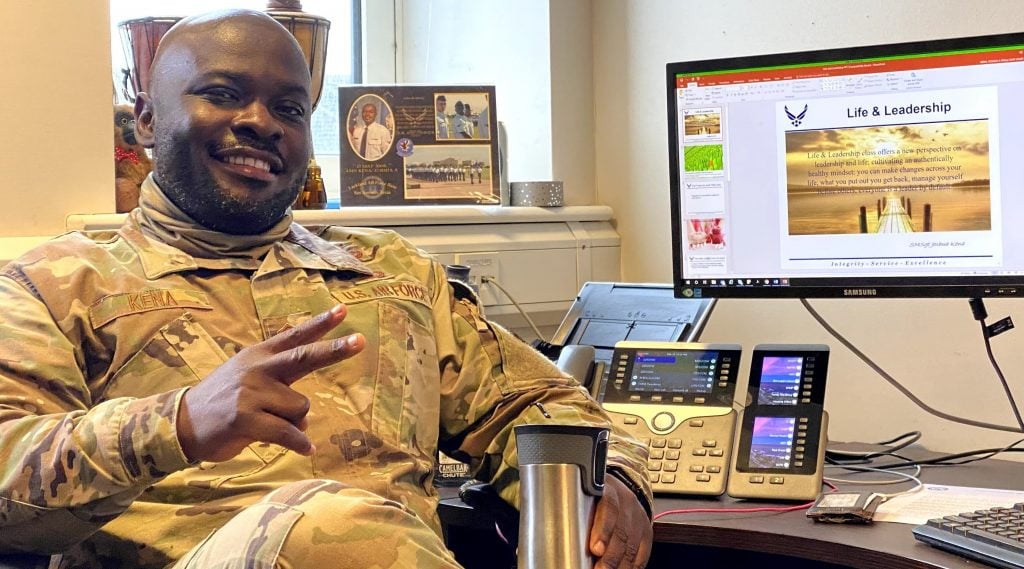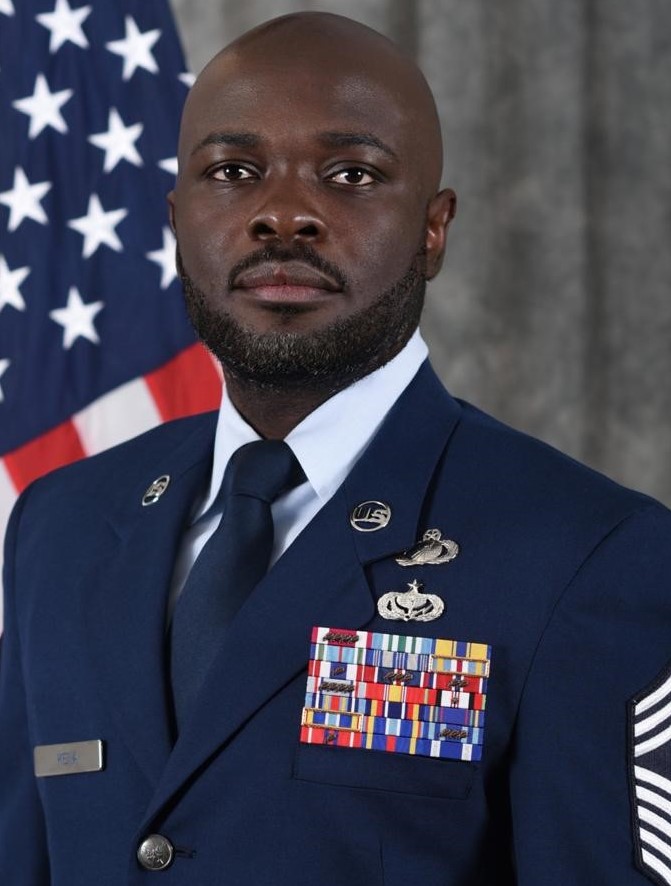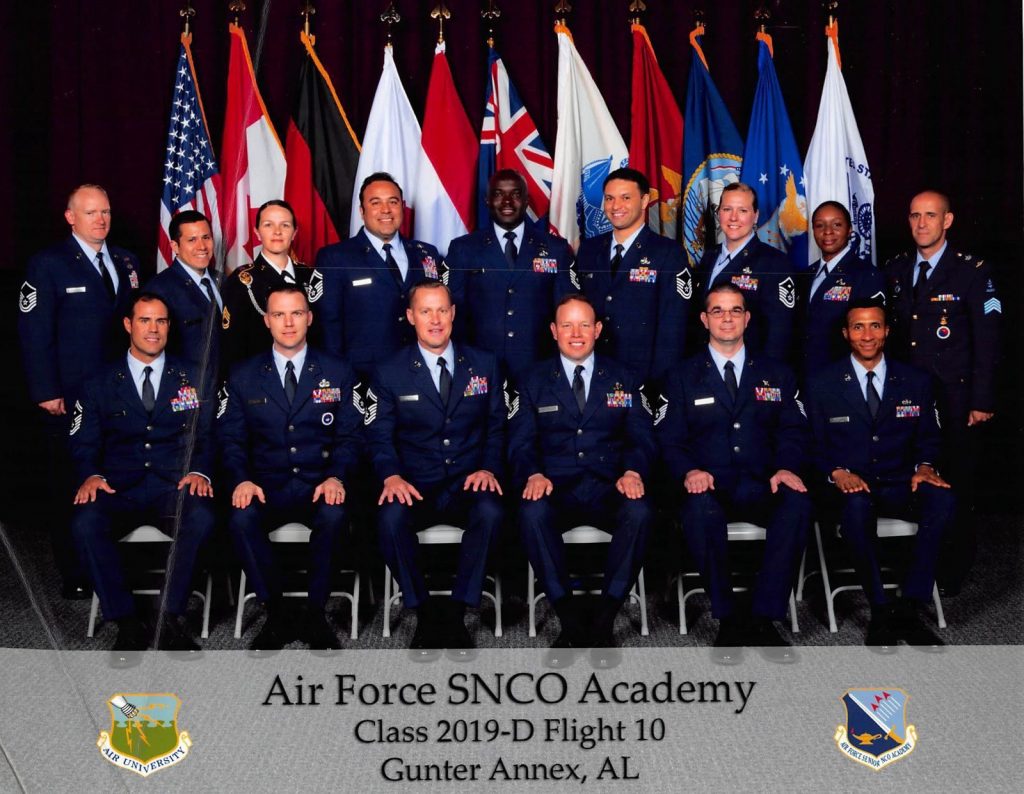
Delivering his dissertation defense at 2:30 in the morning might seem impossible. But it was a pleasure for Joshua Kena.
It meant he cleared the final hurdle in his decadelong journey to earn a doctoral degree, something the U.S. Air Force chief master sergeant said meant more to him than many of the mountains he’s cleared in his life.
“Honestly, I didn't think I was going to make it,” he said on a call from Kadena Air Base in Japan.
His doctoral odyssey started when he left his native Ghana, West Africa, and arrived in the United States more than 20 years ago with one shirt and one pair of pants.
He joined the Air Force, started a family and was deployed several times, all while working on his degree.

“It was like I was in the midst of chaos,” said Kena, who wanted to push himself to the limit.
He started the doctoral process at another university but withdrew after one course and, after a lot of research, chose GCU.
“I recall some advice I got from one of my mentors at the time who said, ‘Hey, get a degree that counts.’ I also realized that a degree that counts isn’t a be-all, end-all, but where the degree is coming from also makes sense, right?”
Kena wanted a university that was accredited, had a physical campus and an athletic program. GCU met his criteria. The sports teams, he said, were “icing on the cake.”
But there was little sweet about his trek toward earning a doctorate until Dr. Kristine Quade, his residency instructor in 2019, agreed to become his chair shortly before the holiday break in December 2023.
“She saved me,” Kena said, smiling. “She unlocked a lot of things for me. She got me going. Dr. Quade was my last hope. And thanks to (content expert) Dr. Michael Williams, who reached out to her and said, ‘Josh has a drive. He just needs guidance.’
“I begged Dr. Quade to take me.”
With time and money for his studies running short, Kena worked feverishly over the holidays, telling his wife and five children he would be studying and away from a lot of the holiday festivities.
“We broke down every single thing, every structure of my dissertation, every proposal,” Kena recalled of his work with Quade. “We started from ground zero.
“I always say I stole her Christmas because she was on standby, constantly giving me quick feedback to get me unlocked, and then kept going because time was of the essence.”
Within 12 months, Kena successfully defended his dissertation. College of Doctoral Studies Dean Dr. Michael Berger signed his dissertation papers this spring, completing an educational arc that started when Kena was a teenager and his test scores were high enough to qualify him for a city boarding school whose students came from affluent families.
... For all these years to come to a close without the trophy or the accomplishment, it wasn't something I was willing to accept
Chief Master Sgt. Joshua Kena, whose doctoral dissertation was signed this spring
“It's a mix of things from how I grew up, my background, and also my military approach and discipline. It's a mindset that when you start something, you finish it,” Kena said.
“And looking at a doctoral degree – the resources, including money, family time, sacrifices, deployment and sleepless nights – for all these years to come to a close without the trophy or the accomplishment, it wasn't something I was willing to accept.”
Kena’s grades earned him financial aid from Georgia Tech and the New York Institute of Technology, but without a full scholarship, he enrolled at the University of Ghana, where he received an invitation to travel to Washington, D.C., as part of an international program.
He registered in the U.S. Diversity Visa Lottery and was selected to receive a green card. He didn't finish his degree at the University of Ghana, instead, joining the military two years later.
“There were a lot of miracles that happened within those two years,” said Kena, adding that a distant uncle connected him with a friend for support once he arrived in the States.
While moving up in military rank, Kena earned a bachelor’s degree in technical management, security and intelligence from Embry-Riddle Aeronautical University in Florida in 2012, and a master’s in acquisition management from Central Michigan University in 2014.
For his dissertation, he wanted to research veterans to find out whether they take the skills they learned in the military with them in their civilian careers.

“There are guys who load bombs on a plane (in the military) ... There are no bombs in the civilian sector, but the skill and the attention to detail it requires to perform those jobs is second to none, right? So if you can find someone who's loaded bombs for at least five years, I promise you, the attention to detail and the attitude for finding the (smallest flaw) or the little things is super high because they train that way.”
Kena learned that skills and life experiences fine-tuned in the military, along with leadership training, can make someone marketable in the civilian world.
He is celebrating his 19th anniversary in the Air Force. Once he transitions to civilian life, he hopes to help veterans. He has met several veterans who were suffering, including one former combat controller who was homeless.
“I’m very passionate about this,” Kena said.
So is Quade about Kena’s ability to connect with people, especially fellow graduates.
“He would be an amazing graduation speaker,” Quade said. “And he would have a strong message about resilience. It’s never giving up.”
At the end of his dissertation defense, Kena told the panel: “I came to America with one bag and nothing else. … Only in America is this story possible.”
GCU News senior writer Mark Gonzales can be reached at [email protected]
***
Related content:
GCU News: Retiring staffer helped College of Doctoral Studies grow to 3,500 dissertations
GCU News: Doctoral inductee marks milestone for GCU's business honor society



































































